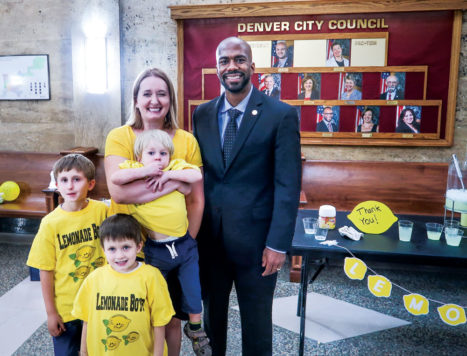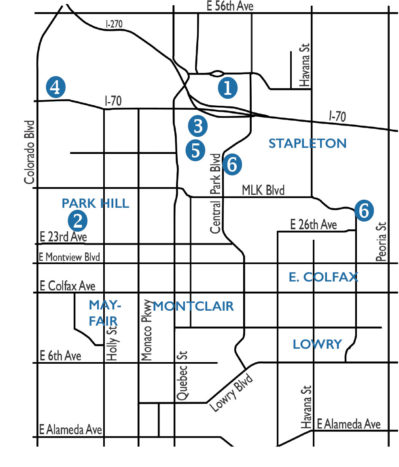1.) Denver kids can now have lemonade stands.
When Stapleton mom Jennifer Knowles and her three boys set up a lemonade stand outside the Denver Art Festival in Conservatory Green back in May, they had no idea they were at the beginning of a small revolution.

Jennifer Knowles and her children (left to right) Benjamin, William and Jonathan (in his mom’s arms) are joined by Councilman Chris Herndon on the day City Council voted to approve children’s lemonade stands.
A licensed vendor’s complaint led to their lemondade stand being shut down by Denver police, an event that many in the community felt was a serious overreach. Denver law required that all vendors—even kids under 10—obtain a business license to sell goods in public places.
But now all that has changed, thanks to the efforts of Knowles, whose story went so viral that the family traveled to New York to appear on Fox & Friends to tell their story, which has been picked up by news outlets across the country. The phrase “Making Lemonades out of Lemons” has become attached to the story, along with a new moniker for Knowles—“Lemonade Mom.”
Thanks to the publicity and Knowles’ advocacy, on September 17, the Denver City Council voted unanimously to allow kids to set up vending booths without a permit.
“The City Council vote gives the kids in our community the ability to wake up on Saturday morning and have a lemonade stand without worrying about permits. Most of us had lemonade stands as a child, and now our children can do the same, legally,” said Knowles in a response via email. “Ben, William, Jonathan and I are thrilled that we could help make a positive change in Denver. We are grateful to Denver City Council and our community for their support.”
Knowles is working on a book about her experience. Look for her family and others around town to get your next legal lemonade fix.
2.) Governor Hickenlooper forms PAC to explore run for president.
Acknowledging that he has “put his toe in the water” for a potential Presidential run, Gov. John Hickenlooper, a Park Hill neighbor, has begun campaigning on behalf of other Democratic candidates around the country. Last month he announced the formation a federal campaign committee that allows him to hire staff, study issues and stump for other candidates. It’s called the Giddy Up PAC, and is led by Brad Komar, who was in charge of running his 2014 re-election campaign.

Governor Hickenlooper introduces Hillary Clinton at a campaign stop in Commerce City in 2016.
Komar told the Front Porch that the governor believes the current political conversation is too “anemic” and he’s hoping the PAC will allow him to speak to voters more directly about the challenges in their lives. Hickenlooper’s first two campaign stops were in Georgia and Florida, where he talked about the benefits of expanding Medicaid eligibility.
Independent political analyst Eric Sondermann said it’s no accident the governor chose to campaign for gubernatorial candidates Stacey Abrams and Andrew Gillum. Both are African Americans from the progressive wing of the Democratic party. “He’s trying to show that even though he’s a centrist, business-oriented, not-all-that-confrontational Democrat, that he still has liberal bona fides. And bona fides in minority communities,” said Sondermann.
In recent weeks, Gov. Hickenlooper has been the subject of several flattering national news stories, which highlighted his record as a moderate politician in a purple state. But Komar resists the notion of trying to peg Hickenlooper as either a centrist or a liberal. “It’s not centrist versus progressive. It’s not establishment versus anti-establishment. It’s about bringing people together on common values and common goals,” said Komar.
3.) What’s happening with the homeless camp along Sand Creek?
Concerns were raised at the September Citizens Advisory Committee about the homeless camp along Sand Creek, west of Central Park Blvd. Tom Gleason of Forest City said trail users had experienced some aggressive panhandling.
Community Resource Officer Marika Putnam said the police outreach team is working with the homeless people living there, offering assistance to get community and mental health services for those who want such services. People who are camping there have told police they regularly clean up their camps. Putnam says when the DPD cleans up, they ask that people put the items they no longer want in a pile to help with the clean up. When the police do a clean up, they bring in a full-sized dumpster, a haz-mat team (to deal with small propane tanks and possible human waste), numerous officers, city officials, and a few inmates from the jail who are supervised by Denver Sheriff Deputies.
Putnam said the police response has been that the area is mostly out of sight and if the residents of the camp aren’t creating problems, they have allowed them to stay due to the fact that once a camp is moved, another will move in. However, if a complaint is brought to the department’s attention, it is handled.
The land has been owned by DIA and was scheduled to be sold to Forest City in late September. Gleason said the land will be used to store fill dirt for future construction. The police will be regularly checking on people at the camp and reminding them of the upcoming move. Once the land transfer is complete and fencing is scheduled to go in, the camp will be removed and no trespass signs will be posted.
4.) I-70 Noise variance approved with conditions.
At a Sept. 6 meeting, the Board of Public Health and Environment reviewed the request for a night time noise variance by Kiewit Meridiam Partners, the contractor for reconstruction of I-70. After consideration of possible public health effects, safety, scheduling, proximity of residences, comments from the public, and information from Kiewit, the board approved a variance with conditions to minimize the negative impact of nighttime noise, with the variance to extend no later than Sept. 6, 2019.
A 20-page document posted with this story on our website details the decision, with noise level limits and other mitigating measures that include:
Limiting the number of consecutive nights noise levels can exceed stated levels in a specific neighborhood
Noise monitoring must be done in response to complaints to verify if levels were exceeded
When noise is predicted to exceed allowable levels, hotel accommodation and/or per diem food and transportation will be available for residents
5.) What’s happening with the request for quiet zones on the A Line?
Denver Transit Partners reinstated crossing guards at specific A line crossings where timing anomalies occurred with the crossing gates. Software changes to the Positive Train Control (PTC) system have been tested and installed on G line trains, and will continue being tested until they can complete a number of end-to-end runs without any anomalies. Once the FRA is satisfied with the results, they will allow deployment of the software update to the entire fleet and the A & B Lines, according to Lisa Trujillo, manager of project outreach for RTD.
Regarding the quiet zone waiver, Trujillo said by email that it was submitted on August 3, 2018, and the FRA put a Notice in the September 4, 2018 Federal Register. They have asked for comments by October 19, 2018. RTD will continue to ensure that all applications and petitions for waivers are complete and accurate to expedite the establishment of Quiet Zones, added Trujillo.
6.) When will the Central Park Bridge open and when will MLK extension to Havana start?
The Central Park Bridge is still expected to open at the end of October, according to Nancy Kuhn, Denver Public Works communication manager.
Kuhn also says, “The current anticipated start for the construction (of the MLK extension to Peoria) is early November.” The Front Porch will follow up with the Colorado Department of Transportation (CDOT) in November and provide more detail on the project start up then.



0 Comments